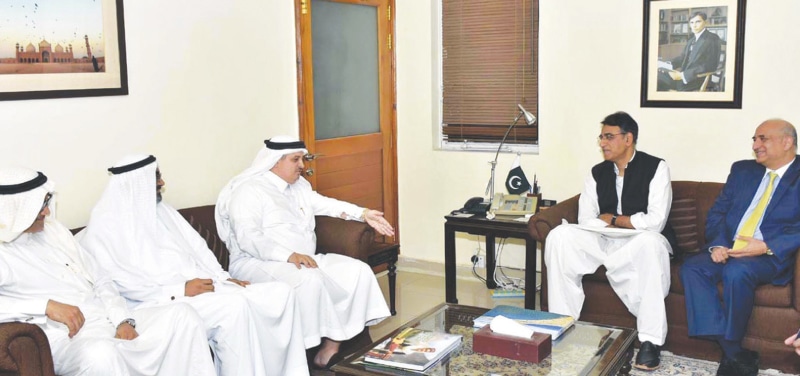
ISLAMABAD: Pakistan and Saudi Arabia on Monday discussed ways and means for supply of more than 100,000 barrels per day (BPD) on deferred payment and more than $12 billion investment, mostly in the petroleum sector.
Sources said Riyadh was expected to be allocated a large piece of land at Gwadar for setting up a 500,000 BPD refinery worth over $9bn besides an oil storage facility for 2-3 million tonnes as part of its plan to secure its export supplies. They said Pakistan promised 16 per cent return on investment in the oil refinery.
Saudi Arabia has around 8-10m BPD of oil exports and wanted to have a storage facility outside the strategic Strait of Hormuz as a back-up for secured supplies to the Eastern clientele.
The delegation led by Ahmad Hameed Al-Ghamdi, adviser of Saudi Arabia’s ministry of energy, industry and mineral resources, had sessions at the power and petroleum divisions and would be visiting Gwadar port and Reko Diq on Tuesday.
During their site visits, the Saudi delegation would also meet provincial authorities to touch base on Reko Diq Copper & Gold Mines because minerals are a provincial subject and provincial representatives were not part of first round of discussions at the federal capital.
S. Arabia may be allocated land at Gwadar for setting up refinery
The sources said the two sides are expected to finalise an early harvest programme for refinery, oil storage and investment in three LNG projects and Reko Diq on the pattern of the China-Pakistan Economic Corridor (CPEC) early harvest programme that delivered more than 10,000MW of power projects in first three years of implementation. Linking Gwadar with Oman through an under the sea tunnel or bridge if finalised would also be a major project involving billions of dollars.
The sources said the memorandums of understanding (MoUs) were in the process of being finalised. They said Saudi ministers for finance and energy were expected to join engagements for formal signing of MoUs, most probably on Thursday. The board of investment was coordinating the meetings with various ministries and divisions.
The move will enable Islamabad to secure supply of petroleum products and crude oil on deferred payments. Insiders said Pakistan authorities requested for 110,000 to 200,000 BPD crude supplies on deferred payments of two years. The guests have indicated that their rules did not allow crude supplies on more than 90-day credit. Pakistani officials said the higher intervention could be helpful.
These officials said the discussions on oil on deferred payment and a refinery had started during the previous PML-N government but obviously nothing could materialise owing to political transition.
They said Riyadh had been looking for diversifying its trade routes, including for oil supplies because of its tension with Qatar and Iran.
It is considering two options — about 40km bridge or tunnel — to link Gwadar with Muscat and Oman at the mouth of Strait of Hormuz on one side and connect its industrial city of Jazan with Eritrea’s Massawa region through a 440km tunnel across the Red Sea. The land route between Muscat and Jazan port is around 2,200km.
Pakistan has been seeking a long-term arrangement for oil supplies on delayed payments as one of the most crucial avenues for balance of payments support. Pakistan normally imports about 110,000 BPD crude oil from Saudi Arabia, out of its total import of about 350,000 BPD.
Riyadh provided deferred payment facility for oil supplies initially for two years soon after Pakistan went nuclear in 1998 and then kept extending the facility for another three years.
Pakistan’s oil import bill amounted to $14.5bn during the financial year ending on June 30, 2018, and could go up to $18bn this year with higher prices and increased consumption.
Published in Dawn, October 2nd, 2018













































